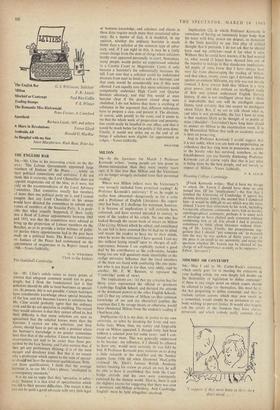Sig,- -Mr. Cline's article raises so many points of interest
that adequate comment would run to great Length, but I think the fundarbental fact is that solicitors should be able to treat barristers as special- ists. At present, this is not possible. Certain barristers have considerable knowledge about special branches of the law, and this becomes known to solicitors, but Mr. Cline would probably agree that the ordinary rank and file do not specialise in anything. The reason they would advance is that they cannot afford to, but their difficulty is that many solicitors arc now so specialised that the solicitor knows more than the barrister. I cannot see why solicitors, and their clients, should have to put up with a position where the barrister's knowledge is no greater (sometimes less) than that of the solicitor. .1 know that barristers' examinations are said to be easier than those pre- scribed by the Law Society, and I also surmise that, if they get any preliminary gaining, it is of the most meagre and desultory kind. But this is no reason why a profession which aspires to the rank of special- ist should not have the necessary qualifications. With- out those qualifications, I think that the average barrister is, to use Mr. Cline's phrase. 'unadapted to contemporary standards.'
It is no use to reply that they 'specialise in advo- eaq,'. because it is that kind of specialisation which has led to their present difficulties. The reason is that you can be quite a good advocate with very little legal
or business knowledge, and solicitors and clients in these days require much more than occasional advo- cacy. As a matter of fact, it is doubtful, in my opinion, whether the ordinary barrister is much better than a solicitor at the common type of advo- cacy, and, if I am right in this, it may be a fairly recent change from the state of things where solicitors hardly ever appeared personally in court. Nowadays, many people would prefer an experienced solicitor in a County Court or Magistrates' Court, if only because a barrister's fee substantially increases the bill. I am sure that a solicitor could do undefended divorces from start to finish as well as a barrister, and that costs would be considerably less if this were allowed. I am equally sure that many solicitors could competently undertake High Court and Quarter Sessions advocacy, and that this would at once become clear if the present closed shop were abolished. I do not believe that there is anything of substance in the argument that, different individuals have to prepare a case, and present it. The division, of course, adds greatly to the costs, and it seems to mc that the whole work of preparation and presenta- tion could easily be handled in one office, and that it would be much better for the public if this were done. Finally, it would not strike mc as the end of all things if solicitors were eligible for appointment as jodges.—Yours faithfully,
SOLICITOR






































 Previous page
Previous page